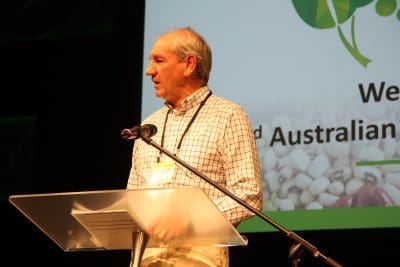
Muhammad Ahmed addresses the APC2019 gathering in Horsham.
A REPORT released at the Australian Pulse Conference (APC) says while megatrends are boosting global demand for plant proteins, pulse exports would remain a significant part of the Australian market.
‘Raising the Pulse’, a report put together by the Grains Research and Development Corporation and Pulse Australia, provides a view to 2030 for pulses in Australia.
It was released yesterday by Pulse Australia chairman Ron Storey as he opened APC2019 in Horsham, Victoria, as the industry’s third triennial event.
In his address, Mr Storey outlined the main points of the report, and said while plant protein was “a very, very significant part” of the changing consumer landscape, exports should not be forgotten.

Pulse Australia chairman Ron Storey
“The sub-continent will remain the backbone of the industry as we know it today.”
While the continued closure of India to volume pulse imports has seen world prices for lentils and chickpeas slump, it has prompted investment in value adding in parallel with an export program which has continued to markets including Pakistan.
Canadian lentils buy Pakistan demand
Addressing APC2019 delegates on the Pakistan pulse market was AWAM Group CEO and Pakistan Pulses Importers Association (PPIA) president Muhammad Ahmed, who was part of the first Pakistani research and trade delegation to attend an APC.
The past few years have been very difficult in terms of our exchange rate, which has had a devaluation of 40 per cent in the past 14 months.
This has come at a period where Pakistan’s annual pulse production has fallen from around one million tonnes to an average of less than 400,000t in the four years to 2019.
“Now area is being overtaken by wheat,” Mr Ahmed said.
“Pakistan used to be an exporter; now it’s an importer.”
………………………………………………………………………………………………………………………………..
| 2016 | 2017 | 2018 | 2019 | |
| Desi chickpea | 300,000 | 300,000 | 350,000 | 350,000 |
| Kabuli chickpea | 60,000 | 60,000 | 75,000 | 30,000 |
| Lentils | 15,000 | 15,000 | 15,000 | 5,000 |
| Total tonnes | 375,000 | 375,000 | 440,000 | 385,000 |
Table 1: Pakistan pulse production. Source: PPIA
……………………………………………………………………………………………………………………………….
Pakistan sows its chickpea crops in December and January, and harvests in April-May, and Mr Ahmed said timely rains pointed to the country being able to produce a good crop in 2020.
“We expect we would be seeding a very good amount of chickpeas.”
This is expected to show a reduction in area planted to desis, and an increased area for kabulis as the more lucrative crop.
…………………………………………………………………………………………………………………………………
| 2016 | 2017 | 2018 | 2019 | |
| Desi chickpea | 155,000 | 420,000 | 212,000 | 41,000 |
| Kabuli chickpea | 170,000 | 181,000 | 207,000 | 240,000 |
| Lentils | 127,000 | 96,000 | 89,000 | 86,000 |
| Yellow peas | 217,000 | 206,000 | 200,000 | 150,000 |
| Black matpe | 44,000 | 86,000 | 67,000 | 43,000 |
Table 2: Pakistan pulse imports. Source: PPIA
……………………………………………………………………………………………………………………………….
Mr Ahmed said Pakistan had imported 32,000t of Australian chickpeas from January to September this year.
In 2017, Pakistan imported 20pc of its desis from Australia, which fell to 11pc in 2018, and is expected to double to 22pc this year.
However, Australia’s share of the Pakistani lentil market has fallen in response to aggressive pricing from Canada as it continues to quit stock built up since India withdrew from the market.
“We’d prefer to buy Australian over Canadian for splitting, but on price, Canada is very competitive.”
As Australia enters its new-crop marketing period, Mr Ahmed gave the market an overall neutral signal on pricing.
“On desi chickpea, we see a very short supply from the globe.
“However, because of the substitution effect with red lentils, and Canada having good stocks, the price should remain stable.”
Grain Central: Get our free daily cropping news straight to your inbox – Click here



HAVE YOUR SAY